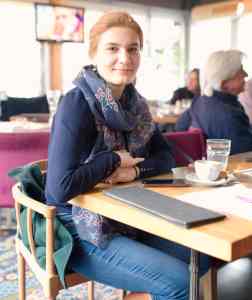Serbia February 2018
When emigrants come back to Serbia this question “why did you not leave” is not uncommon amongst the generation that grew up in the bloody nineties. I ask Rastko Sejic about his experiences. He stayed and runs “What do you want”, an peace activist organization.
Amongst many other productions and activities, Rastko has made a TV series about emigrants who left Serbia when the war in ex-Yugoslavia started. Their reasons were clear but he found out it is not just desperation that motivates Serbs to emigrate.

Living in the Belgrade suburb of Obrenovac where we meet Rastko was politically active during war times and the Milosivic rule. He saddens by the view of most foreigners that all Serbs are chauvinists and have nationalistic ideas. “Did you also kill Muslims” he was once asked by a French girl. A founder of OTPOR, a youth democratic action group during the Milosovic years he had to flee to Montenegro during the NATO bombings. At that time he considered both the regime as well as NATO an enemy of a democratic Serbia. His friend, newspaper publisher Slavko Cruvija who stayed, however, was killed by the secret police. The situation then was such that these killings could take place hardly noticed and without prosecution.
Obrenovac flooded completely in 2014 by the Sava river, largely due to not implemented waterworks renovations and lack of political responsibility. It can happen again as no noticeable measures have been taken still to prevent a repetition of such a catastrophe. “the fear is still there as can be seen when it rains… the streets are empty” Read more about the effects of this flooding in the article Fall down and get up
Shrinking population
Serbia’s population is shrinking, now 7,13 million on a yearly basis the population of several Belgrade suburbs chooses to leave (the latest figure is 2,1% in 2015, though at its high in 2000 it was 10%). It is estimated the total Serbian diaspora now counts between 2,5 and 5 million people of which most live in Germany and Austria. Another factor of the decreasing population is the white “kuga” (pest): due to bleak economic perspectives, many people choose not to have children or if at all just one (resulting in a decrease of around 0,4%).
Like other countries, Serbia cannot be understood without knowing its history that left its mark in the minds and in the organization of society. The country in its present geography must always be seen in the context of the whole region. Balkan, by the way, originates from two Turkish words: Bal and Kan, meaning honey and blood. A very apt description of the area. Serbs are lively and easy to make contact with and in my experience hospitable and helpful. The atmosphere is loose and light but at the same time, a brooding feeling is present on the streets, in coffee houses and in public transportation.

In contrast to other eastern European ex-communist countries outside the Balkan, the wounds are still open here. In Serbia, the war as a result of the separation of Kosovo was the last in a series of violent experiences the majority of the families have experienced first hand. There was only one generation (those around 60) where the men did not go to war.
Emigration during communism “light”
The older generations look back at the Tito era as “not so bad after all”. Communism “light” allowed some free enterprise and the growth of a middle class that experienced relative freedom. The planning economy however also caused a strong depopulation of the countryside resulting in 80% living in the urban areas. The generation after is war scared resulting in a “brain drain” resulting in the title question and a population consists of a large extent of the age group 50 – 57.
The exception is the area of Novi Pazar in the deep south where in the Muslim community the contrary can be observed as young people are overrepresented.
During the wars often emigrants had no choice and leaving was pure survival. The “working class” as a contrast to the ’60s and ’70s where it was just this group that worked outside Yugoslavia, with support from the regime in those years. A lot of them have actually come back for retirement and did not stay in the countries they went for work. The new emigrants leave (when they succeed) for good.
Serbia differs from other war-scarred countries like Ukraine where the ones that leave now are those that have something to offer in the chosen exile county. However, Serbia’s dissatisfaction with the political regime and lack of perspective is another big factor.
Many do well after leaving Serbia as Rastko found out during the production of his TV series (named “Brain Drain”) but he also observes that in many cases the children of emigrants are not educated in Serbian, even deliberately. The roots must be forgotten and the perspective is on the new world. In several conversations Serbians expressed anger against the state, feeling they have been betrayed and left alone. I was told this sentiment prevails with around half of the Serbs.
Feminism and political activism
Biljana Maletin who is of the same generation as Rasko ads more perspective to the role and position of women in Serbia. I meet her in the middle-class suburb of Gorje Grad (upper city) at block 9 (a customary name for an area)> She tells me the feminist movement was already present in the seventies but the traumatic changes in later years took away interest in women equality issues. It was simply off the map.
“ Why bother about this while wars are going on”.
Now life has become relatively quiet the women movement is back on its feet again and pressing for change.
Biljana is one of the leaders of the “Go out to vote” campaign for women 17 year ago. Her movement focussed on mobilizing women to vote, not just for feminist issues, but also for peace and democracy. Today, she is co-founder of the Gender Knowledge Hub and very active in the Women’s Platform for Development of Serbia.
Feminism can in her opinion also be used as a political activator also for bigger political causes. In the early years, this was their “guerilla” strategy as bigger powers tended not to address women, voters. This now has changed, however.

The feminist movement is now particularly trying to influence female politicians and tries to lobby for good lawmaking, An example of this is the new law against domestic violence and violence against women in general that has just passed parliament. However, having a law and enforcing them are again two different issues as corruption is present everywhere.
Biljana continues: Women in Serbia, in general, enjoy a certain level of equality, at least in the urban areas. Girls are overrepresented in higher education and in the population of Belgrade. In the countryside often the girls choose to follow advanced education in Belgrade while the boys stay at home to take care of the family farm and land that traditionally is inherited in the male line of succession. This results in villages almost ridden of young women. Education, however, does not guarantee economic independence for lack of enough positions for the skills learned at University.
She adds: State support for war scared families especially refugees who fled ethnic cleansing in other parts of ex-Yugoslavia, amongst them many widows have disappeared. This leaves support to private charity and family. The victims of rape and the children resulting from these crimes largely stand-alone. The wars are preferably not talked about as memories and emotions are too fresh and
nobody can already say “I am sorry”
There are several layers of traumas and there is a feeling of shame and also some repressed guilt. In contrast to Croatia, nothing was achieved to at least hold on to. The wars caused a progressive deterioration.
“the war was yesterday”
Politically Serbia can be described as a ‘partocracy.’ Though the actors from the communist years may not be present, the ways and means are still there. It is quite common for a politician to just switch parties when it is convenient to keep a powerful position. The reason to join a political party is generally: “I want a job” and not a choice for a cause of ideology. Pa Da Rasko sighs “ah well”.
After the Milosovic years, a democratic era started and there was hope. Now there is a backlash where old nationalism and right-wing ideas again prevail. There are many small citizen initiatives that try to break the power of the bigger parties. One of them is Ne davimo Beograd (“do not drown Belgrade”) that will take part in the municipal elections of Belgrade.
Biljana and Rastko stayed
They did not want to give up the fight. Rastko says:
“I cannot imagine not to express myself in my own beautifull language and to leave our way of living, I keep on fighting”.
Biljana feels the same way and feels changes can be achieved as long as the citizens speak up. The Serbian way of living is too much to give up despite all. I understand them as Belgrade is bustling with art and creativity for instance in the area Savamala.


There is also hope as private entrepreneurs start inventive new businesses and art is flourishing as can be experienced when visiting Belgrade and Novi Sad. Read more about an interesting ecological project in Fatal spices. Joining the EU will make economic advancement for these small companies a lot easier but will take a long time.
 On my travel through Serbia a girl in one of the omnipresent kiosks in Nis, in the south close to Macedonia spontaneously tells me her goal is to become a nurse and work in Germany. Now she spends her time selling single cigarettes for 20 dinars (15 Eurocents) to passing by workers (everyone seems to smoke here) and she has difficulty in keeping friends due to the lack of money. By working in the kiosk she can barely earn enough for food and housing. Outside of this, she cannot do anything, she cannot save money for important future expenses and cannot plan at all. Emigration is the only way out she feels.
On my travel through Serbia a girl in one of the omnipresent kiosks in Nis, in the south close to Macedonia spontaneously tells me her goal is to become a nurse and work in Germany. Now she spends her time selling single cigarettes for 20 dinars (15 Eurocents) to passing by workers (everyone seems to smoke here) and she has difficulty in keeping friends due to the lack of money. By working in the kiosk she can barely earn enough for food and housing. Outside of this, she cannot do anything, she cannot save money for important future expenses and cannot plan at all. Emigration is the only way out she feels.
Her question is “why would I stay”.


















